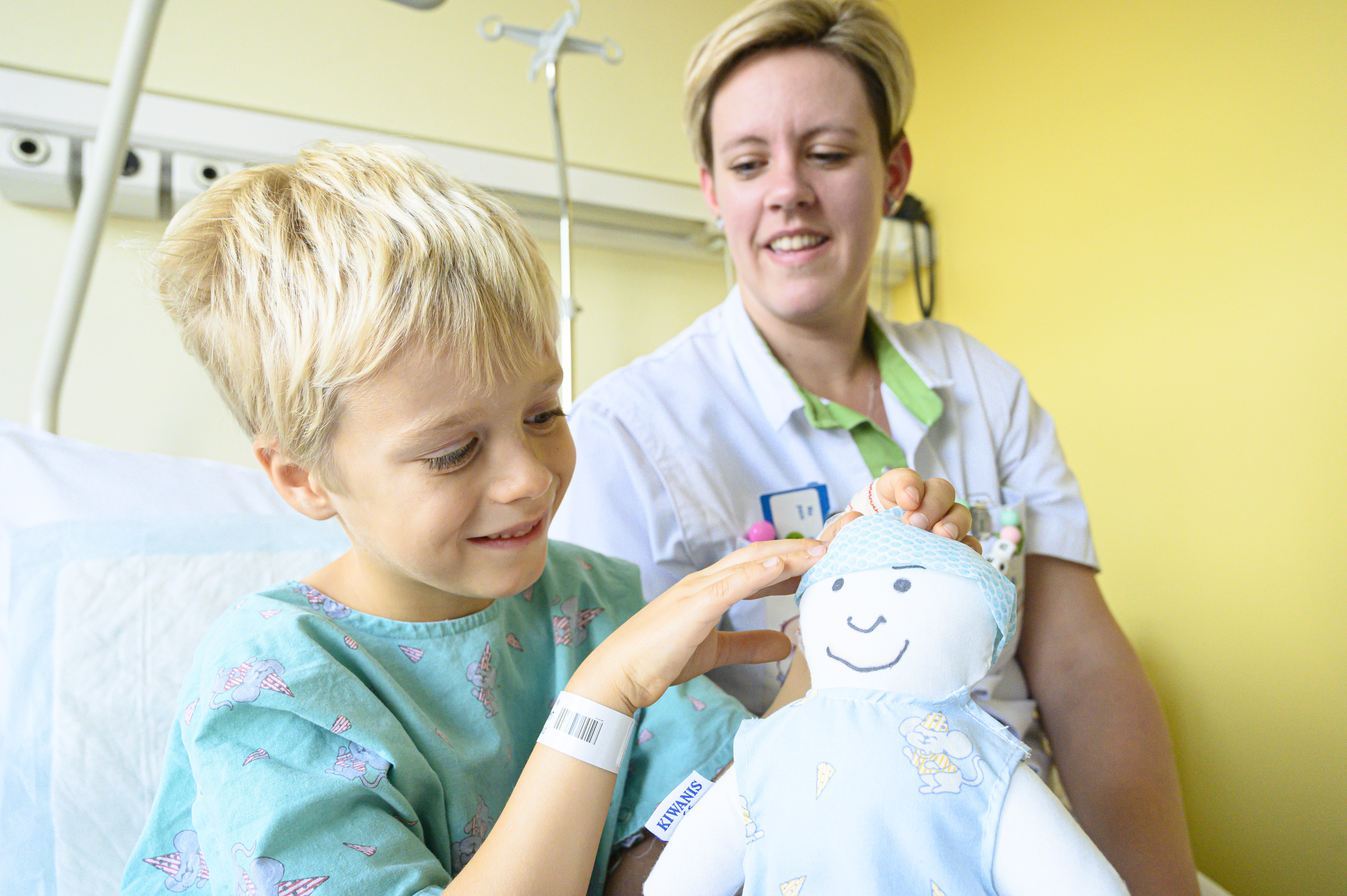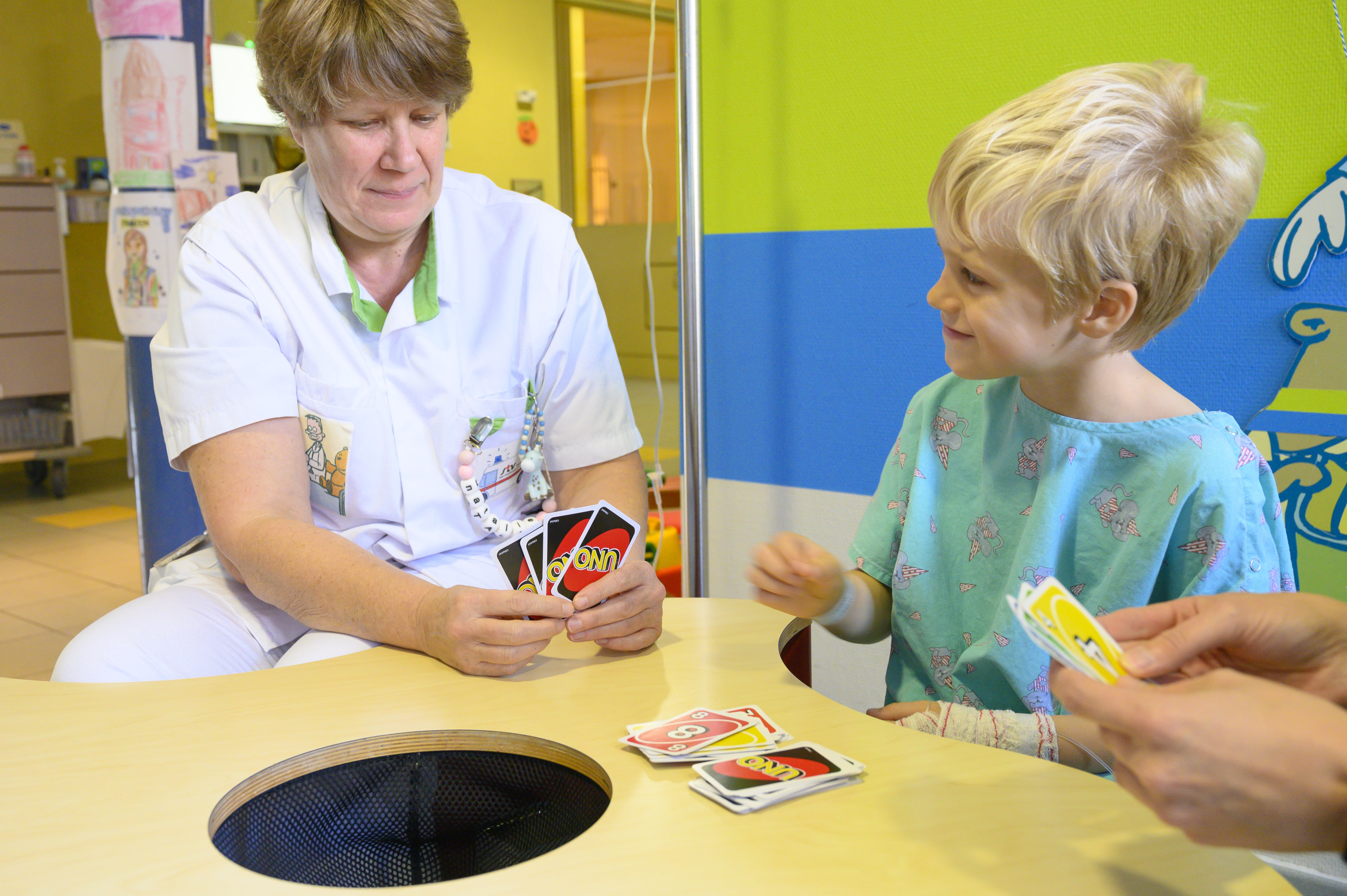Accommodation of your child

Please note
The info on this page only applies to the paediatric ward of St Vincent General Hospital in Deinze.
Wondering what a hospital stay looks like for your child? On this page, you will also find more information on how to prepare your child for admission to the paediatric ward, what to bring to the hospital for this purpose and how the discharge from hospital works.
The way physicians work
The way physicians workThe paediatricians work closely with each other. They have a shared file so that each paediatrician can access the full medical record in the absence of a colleague.
Each week, there is one paediatrician who takes care of the admitted patients in the morning. Do not hesitate to discuss any questions or concerns with the physician. If you are not present when the physician examines your child, arrangements can be made for contact at another time.
Every Monday and Friday, there is an extensive consultation between all paediatricians. This insures that everyone's knowledge and expertise is used for more complex cases.
All paediatricians completed a five-year specialisation course in general paediatrics. We therefore always treat the child as a whole. In addition, each paediatrician has the additional expertise of neonatalogy: medicine for the sick newborn. In addition, the paediatricians specifically trained in several areas. Consequently, you can also come to us with more complex problems. Finally, we collaborate with paramedics and other disciplines where necessary to ensure the best care.
Maternity unit and neonatal unit
Maternity unit and neonatal unitAt the request of the gynaecologist, a paediatrician attends any delivery where there is an increased risk of complications at birth. In case of problems during and shortly after birth, the baby is admitted to the neonatal unit (N* department) where the paediatrician continues to monitor the baby.
Through these links you will find more information about your baby's stay and visit in the neonatal unit.
Paediatrics
PaediatricsAdmitting your child is a drastic event for the whole family, and it is undoubtedly difficult to entrust the care to others. It is therefore a good idea to go through the information leaflets below with your child. This way, your child will already get to know the paediatric ward of St Vincent General Hospital in Deinze a little. Colouring and activity sheets give the child a better view of the hospital world. We also provide some tips on how, as a carer, you can prepare your child before, during and after admission.
Download the 'May I ask you a question, doctor?' brochure here.
- toiletries: flannels, towels, soap, toothpaste, toothbrush, comb...
- pyjamas or comfortable clothing (preferably with wide or short sleeves), slippers
- cuddly toy, dummy, favourite toy and possibly a thermometer
- formula (if applicable)
What better not to bring?
Personal bibs, nappies, sweets, soft drinks and jewellery are better left at home.
| 6am to 6.30 pm | patient meeting by the night nurse with the nurse on early duty |
| 6.30am to 8pm | morning medication is administered (aerosols, syrups, replenishing infusions...), nappy changing and temperature recording, bottle-feeding for toddlers, admission of outpatients |
| 7.30am to 8am | breakfast is served to both children and parents, patient meeting for the entire team |
| 8.15am to 9am | patient meeting for the entire team |
| 9am to 11am | morning care of the child, consultation duty physician paediatrics, any scheduled examinations, cleaning of the rooms |
| 11am | time for medication |
| 12pm | administering lunch to toddlers (bottle-feeding or vegetable porridge, etc.), briefly napping before nap time, serving lunch to older children and sleeping parent |
| from 2.30pm | nappy changing and temperature taking, administering medication, giving fruit purees, bottle-feeding, snack |
| 5pm | serving supper |
| from 6pm | nappy changing and temperature taking, bottle-feeding for toddlers, evening medication is administered |
from 8pm | bedtime for the children, before bedtime another nappy change and temperature check |
| 9pm | patient meeting of the evening nurse with the night nurse |
| from 9.30pm | the night nurse will give medication and feeds during the night, check parameters (temperature reading, pulse, breathing...) |
Together with the game facilitator, one parent may accompany them to the operating theatre. The child must be transported in the bed because of safety regulations.
You can accompany your child into the operating theatre if you wish. After the operation, you will have the opportunity to be back with your child in the recovery room. The nurse will notify you as soon as she can.
The anaesthetist will determine when your child will be allowed to drink again.
Library
There is a small library in the play corner. Once a week, the Red Cross hospital library visits.
Newspapers are on sale daily at reception.

Games and craft materials
Toys and craft materials are available. They is located in an area accessible only to staff. Feel free to ask.
For hygiene reasons, all toys are disinfected after use. For the same reason, we ask not to bring toys from the play corner into the room. After consultation with the attending physician, your child may spend time in the play corner.
Internet
There is free access to the hospital's Wi-Fi network.
The physician will decide when your child can go home. Discharge can be at any time of the day and also on weekends.
Ask for forms related to childcare, school, social leave, insurance on time.
Check the room before leaving so that no personal items are left behind. Also bring your thermometer, soap, aerosol mask and line, and mobile phone charger.
Parent participation
Parent participationA hospital environment is an unfamiliar environment for your child. Children prefer to be looked after by a trusted person. This is why we think your participation as a parent is important. As a parent, you mean security and support for your child in these difficult days.
We invite you to join us in caring for your child.
Consult with the nurse when you want to start washing your child. We are happy to help with the technical aspects (monitor, infusions, weighing...).
You can always change nappies and take their temperature in between.
All medication to be administered is brought to the room by the nurse.
Try to accompany your child to an examination or consultation as much as possible. During surgery, one parent may accompany the child until anaesthesia. After the procedure, you may return to your child in the recovery room.
The child is given an identification tape upon admission. This should be worn throughout the stay.
- Always secure your child with the safety straps of the babysitter or high chair.
- Always pull the bed rails fully up.
- Keep the room door closed at all times for safety and contamination reasons.
Your presence is often enough to reassure your child. A positive and confident attitude can reduce anxiety and insecurity in your child.
Offer your child a chance to express his or her emotions. Also give them honest answers about possible pain or grief.
Tell your child when you will return and also always tell the nurses so that they can explain this to your child.
You will find an observation sheet in your room. On this sheet you may note observations related to your child such as temperature, amount of food ingested, frequency of stool and/or urine, coughing... If you are not comfortable with your child's condition, always report it to the nurses.
Good observations, by both parents and nurses, help the medical team to monitor your child's healing process closely and to adjust care as needed. This ultimately results in a faster recovery and a rapid return home!
- Do not give your child any medication they were taking at home without discussing this first.
- Do not operate medical equipment or infusions yourself.
- Do not provide care to other children.
Parent participation is important, but not an obligation. We fully understand circumstances where you cannot take on all the care of your child. In those situations, we will be pleased to work with you to find the best way for your child.
Rooming-in
Rooming-inRooming-in is part of parent participation and means you can be with your child in hospital not only during the day but also at night and continue to care for your child together with us.
If this is not possible for you, or if the home situation does not allow it, a grandparent, relative or other trusted person can stay with your child in your place.
Want to revisit your decision? You can stop rooming-in at any time.
A sofa bed or bed will be provided for one parent.
Meals for the rooming-in parent can be ordered. There is a choice between breakfast only or all meals.
You can also use the cafeteria on the fourth floor. We ask you not to bring your admitted child to the cafeteria unless with the physician's permission.
Be respectful of your child's and other children's sleep. We ask that the lights and television be turned off on time, as this disturbs sleeping children.
In any absence, it is always desirable to inform a nurse. Even if you, a family member or other trusted person cannot be with your child during hospitalisation, our team (physician, nurse, child psychologist and play leader) guarantees the best care.
In the rooms, a visual check on your child is possible from the corridor. The rooms on the right side of the corridor are equipped with camera surveillance too. The front rooms (facade side) are also equipped with a camera. For minor children (under 12 years old) who are alone in the room, camera surveillance is switched on for safety reasons. The recorded images are only visible to the team (nurse team, play supervisors, child psychologist and paediatricians) on the screens at the desk of the children's ward.
The images are not saved. If you have any comments or questions about this camera surveillance, you may always contact the (head) nurse. She will refer your question to management if necessary.


